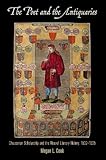The Poet and the Antiquaries : Chaucerian Scholarship and the Rise of Literary History, 1532-1635 / Megan L. Cook.
Material type: TextSeries: Published in cooperation with Folger Shakespeare LibraryPublisher: Philadelphia : University of Pennsylvania Press, [2019]Copyright date: ©2019Description: 1 online resource (288 p.) : 12 illusContent type:
TextSeries: Published in cooperation with Folger Shakespeare LibraryPublisher: Philadelphia : University of Pennsylvania Press, [2019]Copyright date: ©2019Description: 1 online resource (288 p.) : 12 illusContent type: - 9780812295825
- Antiquarians -- England -- History -- 16th century
- Antiquarians -- England -- History -- 17th century
- Civilization, Medieval, in literature
- English literature -- Early modern, 1500-1700 -- History and criticism
- Medievalism -- England -- History -- 16th century
- Medievalism -- England -- History -- 17th century
- LITERARY CRITICISM / Modern / 16th Century
- Cultural Studies
- Literature
- Medieval and Renaissance Studies
- 821/.1 23
- PR1924
- online - DeGruyter
| Item type | Current library | Call number | URL | Status | Notes | Barcode | |
|---|---|---|---|---|---|---|---|
 eBook
eBook
|
Biblioteca "Angelicum" Pont. Univ. S.Tommaso d'Aquino Nuvola online | online - DeGruyter (Browse shelf(Opens below)) | Online access | Not for loan (Accesso limitato) | Accesso per gli utenti autorizzati / Access for authorized users | (dgr)9780812295825 |
Frontmatter -- Contents -- A Note on Spelling and Punctuation -- Introduction. “Only by Thy Books”: Knowing Chaucer in Early Modern England -- Chapter 1. The First First Folios: Chaucer’s Works in Print -- Chapter 2. “Noster Galfridus”: Chaucer’s Early Modern Biographies -- Chapter 3. “For Every Man to Read That Is Disposed”: Chaucer the Proto-Protestant -- Chapter 4. “Difficulties Opened”: Confronting Chaucer’s Archaism in Spenser and the 1598/1602 Works -- Chapter 5. Chaucer’s Herald: The Work of Francis Thynne -- Chapter 6. Chaucer’s Scholarly Readers in Seventeenth-Century England -- Coda. Chaucer in the House of Fame -- Notes -- Bibliography -- Index -- Acknowledgments
restricted access online access with authorization star
http://purl.org/coar/access_right/c_16ec
Between 1532 and 1602, the works of Geoffrey Chaucer were published in no less than six folio editions. These were, in fact, the largest books of poetry produced in sixteenth-century England, and they significantly shaped the perceptions of Chaucer that would hold sway for centuries to come. But it is the stories behind these editions that are the focus of Megan L. Cook's interest in The Poet and the Antiquaries. She explores how antiquarians—historians, lexicographers, religious polemicists, and other readers with a professional, but not necessarily literary, interest in the English past—played an indispensable role in making Chaucer a figure of lasting literary and cultural importance.After establishing the antiquarian involvement in the publication of the folio editions, Cook offers a series of case studies that discuss Chaucer and his works in relation to specific sixteenth-century discourses about the past. She turns to early accounts of Chaucer's biography to show how important they were in constructing the poet as a figure whose life and works could be known, understood, and valued by later readers. She considers the claims made about Chaucer's religious views, especially the assertions that he was a proto-Protestant, and the effects they had on shaping his canon. Looking at early modern views on Chaucerian language, she illustrates how complicated the relations between past and present forms of English were thought to be. Finally, she demonstrates the ways in which antiquarian readers applied knowledge from other areas of scholarship to their reading of Middle English texts.Linking Chaucer's exceptional standing in the poetic canon with his role as a symbol of linguistic and national identity, The Poet and the Antiquaries demonstrates how and why Chaucer became not only the first English author to become a subject of historical inquiry but also a crucial figure for conceptualizing the medieval in early modern England.
Mode of access: Internet via World Wide Web.
In English.
Description based on online resource; title from PDF title page (publisher's Web site, viewed 25. Jun 2024)


